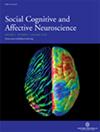Mothers’ and Fathers’ Neural Responses Toward Gender-Stereotype Violations by their Own Children
IF 3.1
2区 医学
Q2 NEUROSCIENCES
引用次数: 0
Abstract
Gender stereotypes facilitate people’s processing of social information by providing assumptions about expected behaviors and preferences. When gendered expectations are violated, people often respond negatively, both on a behavioral and neural level. Little is known about the impact of family kinship on the behavioral and neural reactions to gender-stereotype violations. Therefore, we examined whether parents show different responses when gender stereotypes are violated by their own children versus unknown children. The sample comprised 74 Dutch families with a father (Mage = 37.54), mother (Mage = 35.83), son and daughter aged 3-6 years. Electro-encephalography (EEG) measurements were obtained while parents viewed pictures of their own and unknown children paired with toy or problem behavior words that violated or confirmed gender stereotypes. In half of the trials, parents evaluated the appropriateness of toy-gender and behavior-gender combinations. Parents showed stronger LPP amplitudes toward gender stereotype-violating behaviors by own children compared to unknown children. Moreover, parents’ P1 responses toward gender stereotype-violating child behaviors were stronger for boys than for girls, and for parents who evaluated gender-stereotype violations as less appropriate than gender-stereotype confirmations. The findings indicated that gender-stereotype violations by parents’ own children are particularly salient and viewed as less appropriate than gender-stereotype confirmations.母亲和父亲对自己子女违反性别陈规定型观念的神经反应
性别刻板印象通过提供对预期行为和偏好的假设,促进人们对社会信息的处理。当性别期望被违背时,人们往往会在行为和神经层面上做出负面反应。关于家庭亲缘关系对违反性别陈规定型的行为和神经反应的影响,人们知之甚少。因此,我们研究了当自己的孩子和不认识的孩子违反性别刻板印象时,父母是否会表现出不同的反应。样本包括 74 个荷兰家庭,父亲(Mage = 37.54)、母亲(Mage = 35.83)、儿子和女儿的年龄均为 3-6 岁。父母在观看自己孩子和未知孩子的照片时,脑电图(EEG)测量结果与违反或证实性别刻板印象的玩具或问题行为词语相匹配。在一半的试验中,家长评估了玩具-性别和行为-性别组合的适当性。与未知儿童相比,家长对自己孩子违反性别刻板印象的行为表现出更强的 LPP 振幅。此外,对于违反性别刻板印象的儿童行为,男孩家长的 P1 反应强于女孩家长,而对于违反性别刻板印象的行为,家长的 P1 反应强于确认性别刻板印象的行为。研究结果表明,与确认性别陈规定型观念相比,父母自己的孩子违反性别陈规定型观念的行为尤为突出,而且被认为不那么恰当。
本文章由计算机程序翻译,如有差异,请以英文原文为准。
求助全文
约1分钟内获得全文
求助全文
来源期刊
CiteScore
6.80
自引率
4.80%
发文量
62
审稿时长
4-8 weeks
期刊介绍:
SCAN will consider research that uses neuroimaging (fMRI, MRI, PET, EEG, MEG), neuropsychological patient studies, animal lesion studies, single-cell recording, pharmacological perturbation, and transcranial magnetic stimulation. SCAN will also consider submissions that examine the mediational role of neural processes in linking social phenomena to physiological, neuroendocrine, immunological, developmental, and genetic processes. Additionally, SCAN will publish papers that address issues of mental and physical health as they relate to social and affective processes (e.g., autism, anxiety disorders, depression, stress, effects of child rearing) as long as cognitive neuroscience methods are used.

 求助内容:
求助内容: 应助结果提醒方式:
应助结果提醒方式:


